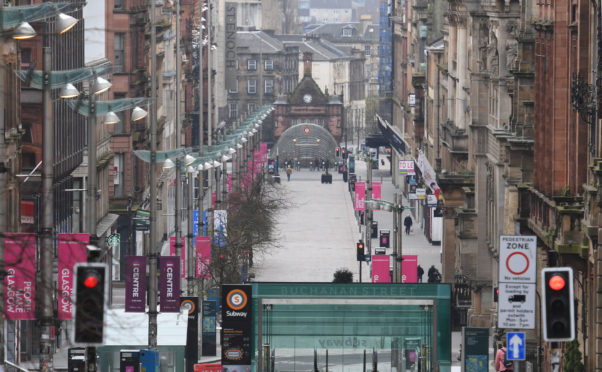
Scotland has recorded its “worst ever” retail sales performance as the industry struggles to cope with the coronavirus pandemic.
Total sales north of the border dropped 13% in comparison with March 2019, when they decreased by 3.7%, according to the Scottish Retail Consortium (SRC)-KPMG Scottish Retail Sales Monitor.
It is the lowest such figure recorded by the monitor since it began in January 1999 – and even adjusted for deflation the decrease sits at 12.2%.
The new figures come after Scotland’s chief economist warned GDP faces an “unprecedented” drop of as much as 33% due to the impact of the virus.
Ewan MacDonald Russell, SRC head of policy and external affairs, said “March was nothing less than a shocker on Scotland’s high streets” following the government lockdown.
He added: “These are truly dismal figures, which expose just how hard retail has been hammered by coronavirus.
“The worst overall retail sales performance ever. The worst non-food sales ever. The worst fashion and footwear sales ever.”
He added: “Beneath the headline figures is a tale of extreme polarisation.
“The first three weeks of the trading period saw unprecedented levels of grocery shopping, with household staples being stockpiled before sales fell back into negative territory in the last two weeks.
“Across the month, office supplies, toys and games, health and hygiene products, and fridges and freezers all saw stellar growth as customers adapted homes for lockdown.
“Conversely, the bad news was truly rotten. Fashion and footwear sales collapsed. Large item sales crumbled as consumer confidence fell sharply.
“Across the board consumers appear to be reducing spending as they adapt to these new circumstances and economic concerns.”
Pre-lockdown, the monitor recorded a 9% growth in the first three weeks of March but this was followed by a decline of 44% in the last two weeks of that period.
Scottish sales decreased by 14.5% on a like-for-like basis compared with March 2019, a four-week month when they decreased by 4.1%.
Total food sales were up 12.1% against the previous year while total non-food sales were 33.6% down compared to March 2019 when they were down 5.6%.
Adjusted for the estimated effect of online sales, total non-food sales decreased by 27.9%.
The Scottish Government advice during the Covid-19 outbreak has warned people to only leave their homes for essential shopping trips or exercise.
Numerous packages of support have been introduced to help businesses cope with the pressures brought on by having to close until it is deemed safe to reopen.
Mr MacDonald Russell said: “Retail has gone through the most difficult month in a generation.
“Many businesses are closed, whilst those who remain trading are doing so in incredibly hard circumstances.
“Enormous investment has been made at pace to protect colleagues and customers, to maintain supply chains and to expand online capacity to help those who need it.”
He added: “In this period, retail workers have worked incredibly hard to continue to provide the vital goods families require.
“Throughout the last month the Scottish and UK Governments have made unprecedented fiscal interventions to support the economy.
“Those vital and welcome schemes, including rates relief, worker support, and grants, are keeping many retailers afloat.
“Hopefully that will ensure our industry can play its part in getting the economy back on its feet when the time is right.”

Enjoy the convenience of having The Sunday Post delivered as a digital ePaper straight to your smartphone, tablet or computer.
Subscribe for only £5.49 a month and enjoy all the benefits of the printed paper as a digital replica.
Subscribe